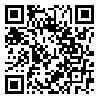Volume 36, Issue 141 (May 2023)
IJN 2023, 36(141): 52-65 |
Back to browse issues page
Download citation:
BibTeX | RIS | EndNote | Medlars | ProCite | Reference Manager | RefWorks
Send citation to:



BibTeX | RIS | EndNote | Medlars | ProCite | Reference Manager | RefWorks
Send citation to:
Baradari M, Shoghi M. Correlation Between Mother-infant Attachment and Fear of COVID-19 in Mothers of Neonates Admitted to the Neonatal Intensive Care Units in Tehran, Iran During the COVID-19 Pandemic. IJN 2023; 36 (141) :52-65
URL: http://ijn.iums.ac.ir/article-1-3613-en.html
URL: http://ijn.iums.ac.ir/article-1-3613-en.html
1- Department of Pediatric and Neonatal Intensive Care Nursing, Nursing and Midwifery School, Iran University of Medical Science, Tehran, Iran.
2- Nursing and Midwifery Care Research Center, Health Management Research Institute, School of Nursing and Midwifery, Iran University of Medical Sciences, Tehran, Iran. ,shoghi.m@iums.ac.ir
2- Nursing and Midwifery Care Research Center, Health Management Research Institute, School of Nursing and Midwifery, Iran University of Medical Sciences, Tehran, Iran. ,
Abstract: (3199 Views)
Background & Aims Infant hospitalization in the neonatal intensive care unit (NICU) causes loss or delay in mother-infant attachment. On the other hand, quarantine and social distancing during the COVID-19 epidemic had psychological consequences, such as increased fear of infection. This study aims to determine the relationship between mother-infant attachment and fear of COVID-19 in mothers with neonates admitted to the NICUs of selected hospitals in Tehran, Iran, during the COVID-19 pandemic.
Materials & Methods In this descriptive-correlational study, participants were 195 mothers with neonates admitted to the NICUs of selected teaching hospitals affiliated to Iran University of Medical Sciences in 2021. Data collection tools were a demographic form, the fear of COVID-19 scale (FCoV-19S), and Avant’s mother-infant attachment behaviors questionnaire, which were completed by the researcher. Data were analyzed in SPSS software using independent t-test, Kruskal-Wallis test, Mann-Whitney U test, and ANOVA.
Results The mean score of FCoV-19S was 19.04±5.40, and the mean score of mother-infant attachment was 70.12±50.65. No significant relationship was observed between the fear of COVID-19 and mother-infant attachment (P>0.05). Fear of COVID-19 had a significant relationship with the interest in the baby’s gender (P=0.001) and the mother’s education level (P=0.041). Mother-infant attachment had a significant relationship with interest in the baby’s gender (P=0.01) and infant hospitalization due to jaundice (P=0.049).
Conclusion Mother-infant attachment of the mothers in this study is low, and their fear of COVID-19 is almost high. There is no significant correlation between the fear of COVID-19 and mother-infant attachment. It is necessary to pay attention to effective factors in promoting emotional attachment between mothers and neonates hospitalized in the NICUs. It is also recommended that the medical staff and nurses pay attention to this group of mothers during pandemics such as COVID-19 and use some techniques to reduce their fear of infection.
Materials & Methods In this descriptive-correlational study, participants were 195 mothers with neonates admitted to the NICUs of selected teaching hospitals affiliated to Iran University of Medical Sciences in 2021. Data collection tools were a demographic form, the fear of COVID-19 scale (FCoV-19S), and Avant’s mother-infant attachment behaviors questionnaire, which were completed by the researcher. Data were analyzed in SPSS software using independent t-test, Kruskal-Wallis test, Mann-Whitney U test, and ANOVA.
Results The mean score of FCoV-19S was 19.04±5.40, and the mean score of mother-infant attachment was 70.12±50.65. No significant relationship was observed between the fear of COVID-19 and mother-infant attachment (P>0.05). Fear of COVID-19 had a significant relationship with the interest in the baby’s gender (P=0.001) and the mother’s education level (P=0.041). Mother-infant attachment had a significant relationship with interest in the baby’s gender (P=0.01) and infant hospitalization due to jaundice (P=0.049).
Conclusion Mother-infant attachment of the mothers in this study is low, and their fear of COVID-19 is almost high. There is no significant correlation between the fear of COVID-19 and mother-infant attachment. It is necessary to pay attention to effective factors in promoting emotional attachment between mothers and neonates hospitalized in the NICUs. It is also recommended that the medical staff and nurses pay attention to this group of mothers during pandemics such as COVID-19 and use some techniques to reduce their fear of infection.
Type of Study: Research |
Subject:
nursing
Received: 2022/09/12 | Accepted: 2023/04/21 | Published: 2023/05/1
Received: 2022/09/12 | Accepted: 2023/04/21 | Published: 2023/05/1
Send email to the article author
| Rights and permissions | |
 |
This work is licensed under a Creative Commons Attribution-NonCommercial 4.0 International License. |







